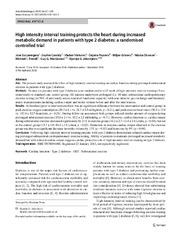Prikaz osnovnih podataka o dokumentu
High intensity interval training protects the heart during increased metabolic demand in patients with type 2 diabetes: a randomised controlled trial
| dc.creator | Suryanegara, Jose | |
| dc.creator | Cassidy, Sophie | |
| dc.creator | Ninković, Vladan | |
| dc.creator | Popović, Dejana | |
| dc.creator | Grbović, Miljan | |
| dc.creator | Okwose, Nduka | |
| dc.creator | Trenell, Michael I. | |
| dc.creator | MacGowan, Guy G. | |
| dc.creator | Jakovljević, Đorđe G. | |
| dc.date.accessioned | 2019-09-02T12:10:03Z | |
| dc.date.available | 2019-09-02T12:10:03Z | |
| dc.date.issued | 2019 | |
| dc.identifier.issn | 0940-5429 | |
| dc.identifier.uri | https://farfar.pharmacy.bg.ac.rs/handle/123456789/3303 | |
| dc.description.abstract | AimThe present study assessed the effect of high intensity interval training on cardiac function during prolonged submaximal exercise in patients with type 2 diabetes.MethodsTwenty-six patients with type 2 diabetes were randomized to a 12 week of high intensity interval training (3 sessions/week) or standard care control group. All patients underwent prolonged (i.e. 60min) submaximal cardiopulmonary exercise testing (at 50% of previously assess maximal functional capacity) with non-invasive gas-exchange and haemodynamic measurements including cardiac output and stroke volume before and after the intervention.ResultsAt baseline (prior to intervention) there was no significant difference between the intervention and control group in peak exercise oxygen consumption (20.36.1 vs. 21.75.5ml/kg/min, p=0.21), and peak exercise heart rate (156.3 +/- 15.0 vs. 153.8 +/- 12.5 beats/min, p=0.28). During follow-up assessment both groups utilized similar amount of oxygen during prolonged submaximal exercise (15.0 +/- 2.4 vs. 15.2 +/- 2.2ml/min/kg, p=0.71). However, cardiac function i.e. cardiac output during submaximal exercise decreased significantly by 21% in exercise group (16.2 +/- 2.7-12.8 +/- 3.6L/min, p=0.03), but not in the control group (15.7 +/- 4.9-16.3 +/- 4.1L/min, p=0.12). Reduction in exercise cardiac output observed in the exercise group was due to a significant decrease in stroke volume by 13% (p=0.03) and heart rate by 9% (p=0.04).Conclusion Following high intensity interval training patients with type 2 diabetes demonstrate reduced cardiac output during prolonged submaximal cardiopulmonary exercise testing. Ability of patients to maintain prolonged increased metabolic demand but with reduced cardiac output suggests cardiac protective role of high intensity interval training in type 2 diabetes.Trial registration ISRCTN78698481. Registered 23 January 2013, retrospectively registered. | en |
| dc.publisher | Springer-Verlag Italia Srl, Milan | |
| dc.relation | UK National Institute for Health Research Newcastle Biomedical Research Centre in Ageing and Long-Te | |
| dc.rights | openAccess | |
| dc.source | Acta Diabetologica | |
| dc.subject | Cardiac function | en |
| dc.subject | Type 2 diabetes | en |
| dc.subject | HIIT | en |
| dc.subject | Submaximal exercise | en |
| dc.title | High intensity interval training protects the heart during increased metabolic demand in patients with type 2 diabetes: a randomised controlled trial | en |
| dc.type | article | |
| dc.rights.license | ARR | |
| dcterms.abstract | Тренелл, Мицхаел И.; Сурyанегара, Јосе; МацГоwан, Гуy Г.; Поповић, Дејана; Грбовић, Миљан; Окwосе, Ндука; Цассидy, Сопхие; Нинковић, Владан; Јаковљевић, Ђорђе Г.; | |
| dc.citation.volume | 56 | |
| dc.citation.issue | 3 | |
| dc.citation.spage | 321 | |
| dc.citation.epage | 329 | |
| dc.citation.other | 56(3): 321-329 | |
| dc.citation.rank | M22 | |
| dc.identifier.wos | 000459478700007 | |
| dc.identifier.doi | 10.1007/s00592-018-1245-5 | |
| dc.identifier.pmid | 30387015 | |
| dc.identifier.scopus | 2-s2.0-85055999953 | |
| dc.identifier.fulltext | https://farfar.pharmacy.bg.ac.rs//bitstream/id/1869/3301.pdf | |
| dc.type.version | publishedVersion |

